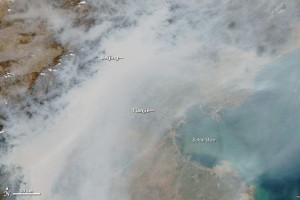Trouble in the Air
“The modulated storm track can be linked to abnormal weather behavior in the mid-latitudes of the Northern hemisphere, including U.S. and Canada.” — Yuan Wang, postdoctoral fellow at NASA U.S. Jet Propulsion Lab
So it wasn’t just our minds playing tricks on us! Well, of course we knew the heavy dosage of weather received this past winter in the Northeast United States was for real. But those of us who said it was because of China were correct all along!
I’ll be the first to admit that although I did say it was due to our ever-changing climate, I had no idea China – or the East overall – may have had a direct impact on our [severe] US weather patterns here in the West. That is definitely interesting stuff. As the CNN article explains, after a decade-long research project, it’s been concluded that the “Pacific storm track is a major driving force over global weather patterns.” How?
Aerosols!
Aerosols — fine particulates in the air, examples of which include haze, dust, particulate air pollutants and smoke — make their way from densely polluted Asian airspaces to those over the Pacific region, where they alter and intensify the storm track. Basically, there are cyclone systems of air out there that naturally transport heat and moisture from low to high latitude areas. As one National Geographic article explains, these changes are spurred by the aerosols’ effect on sunlight in the atmosphere. Aerosols in the air can scatter and absorb sunlight, effectively heating or cooling the surrounding climate. If these aerosols change the patterns of the cyclone systems, therefore distorting the transportation of the heat and moisture, those distortions of global heat distribution certainly carry the potential to distort global weather patterns overall.

